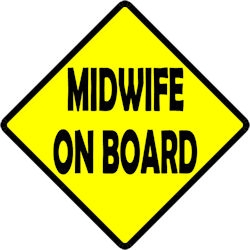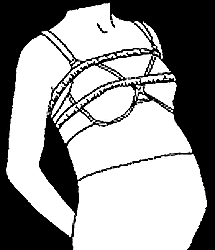 On occasion, I receive correspondence from various people asking me how I know what I know about birth and motherhood, since I have no children of my own. They want to know where I trained and what sort of "hidden agenda(s)" I might have. I take this as a compliment. There is a lot of varied information out there about childbirth, motherhood, fashion, and nutrition. I'm so thankful I don't have to know everything there is to know about those things. I don't know everything there is to know about childbirth and motherhood! And if you've ever met me, you know I'm hopelessly fashionless. My credentials are outlined on my website, if you want to know what all of the fancy letters mean (squat, in fact). So while you're here, please enjoy the laundry as I air out my closet. I believe: The baby will come out. It's amazing, but true. You will not be pregnant with this baby forever, and you can probably give birth vaginally. If your provider says you can't, and you want to, ask lots of questions and/or get a second opinion. The overwhelming majority of the time, a women grows a baby/babies she can give birth to. It does not make sense that we have lived 3.5 million years on Earth by growing babies too big to birth. It's a tight squeeze, and in very rare cases it is not physically possible. We are lucky to have modern medicine and obstetric care. When problems arise, babies come early, mamas get sick, or accidents happen, we are incredibly fortunate to have access to lifesaving procedures, medications, and information. Doulas are superheros. And worth every penny, even if you love your provider, your spouse and your mother and want everyone in the room when you give birth. What's a doula? How do you choose? How do you hire me as your doula? You are not expected to know everything about birth before you have your baby. And if you do, it's a waste of time. You are not going to turn around and deliver the next baby, you just need to know enough to feel confident in your team. A birth class will tell you what you need to know. The internet is for porn. (That's a line from a musical). The internet is not for birth or mothering advice! There are safe places where you can get good, reputable information, and great places where you can network and commiserate about how long it has been since you peed alone. Dr. Google is not your friend. What to Expect When You're Expecting is not worth your time. This book is about being afraid. Being very afraid. The authors forgot that birth is normal and that everyone walking around was born. I recommend these alternatives. Breastfeeding is normal, natural, and possible (and comes with some hurdles). The hurdles are real and without help, it can feel impossible to move forward. Help exists. Learn about it. Please ask me. Everyone is trying to sell you things, because you're part of a "market." For instance, I would like you to come to my classes. Other people want you to buy things not because you need them, but because they are selling them. This includes me. You don't need prenatal yoga. You don't need a crib skirt. Right? Boobs and a carseat are the only things you actually need before baby comes. If you're pregnant, you're halfway there. You can buy things later, I promise. Motherhood isn't all roses and rainbows. Everyone has a different journey to motherhood, with different baggage. You do actually need Mom & Me yoga to form a community where you can remember that you're doing everything right (even when you do something wrong). There are bad mothers out there, but you're probably not one of them. Everyone tells me, "I'm such a bad mother!" Then they talk about the time they put junior in mismatched socks, or turned their back and he rolled off of the couch, or gave him formula. Everyone makes mistakes, and mistakes do not make you a bad mother. You are beautiful. Yep, you. Even if you're covered in spit up or your ankles are as wide as your hips. Mama lions are amazing and so are you. Rawr. That's my agenda. I reserve the right to amend it at any time. What did I miss?
2 Comments
 Perhaps you're nearly as confused as I was about what a “midwife” does (versus what a “doula” or your “mother-in-law” might do to support you during labor). Let me spell it out for you in super plain English. Homebirth Midwives: Are able to practice well-woman care, like pap smears and exams, and attend the births of healthy women carrying healthy pregnancies. They do not prescribe prescription medication, nor do they offer medical pain relief methods or procedures. Most often their care includes visits to your home before and after baby is born. Appointments with home birth midwives tend to be longer and more frequent than with other birth attendants. Certified Professional Midwife This woman has trained for years in both an academic and practical setting and then passed two grueling exams: one on paper, another eight-hour practical exam. It is the only credential that requires experience delivering babies both inside and outside of hospital settings. Legally, CPM's can practice in 26 states (although each state sets the standards for who may or may not practice in a medical setting like a hospital or birth center). http://www.nacpm.org/what-is-cpm.html Registered Midwife (in Colorado) This woman has trained for years in a variety of settings, from academic to apprenticeship. She must register with the state of Colorado and is the only birth professional permitted to attend home births. They must either take a training program through a recognized school or provide proof of equivalent experience and education. http://www.coloradomidwives.org/registered-midwives-and-certified-nurse-midwives Hospital Birth Midwives Somewhere between a homebirth midwife and an OB/GYN, a hospital birth midwife frequently works with healthy women carrying healthy pregnancies, but is also trained in the medical model and may offer medical interventions like pharmaceutical drugs and minor surgical procedures. Hospital birth midwives work in a medical office and do not travel to your home before or after baby is born. Their appointment times are often longer than the appointments of an obstetrician seeing a healthy pregnant woman. Certified Nurse Midwife This individual (the majority of whom are women) has a bachelor's degree in nursing and then a post-graduate degree (two years) in labor and delivery. She must practice within the scope of an obstetrician, meaning her philosophy of care is supervised/directed by a physician. http://www.midwife.org There are a whole host of organizations that offer credentials to midwives, and that is because there did not used to be a single organization. Each state had to define their own rules regarding midwifery care. Your midwife may carry a credential that is not listed here, and she may still be an excellent caregiver. Regardless of the midwife you choose, you should know that your midwife is NOT a DOULA, or a person who is dedicated as a labor support person. Midwives provide perinatal health care, but will not arrive at your labor as soon as it begins. Typically, you make several phone calls to your midwife as your labor progresses and s/he evaluates when to meet you at your house/hospital. Some home birth midwives are also trained as doulas, but they will not perform both functions at once. In the event you need or choose to transport to a hospital, your home birth midwife may serve as a doula depending on her training and scope of practice. Clear as mud? Great. Have a conversation with your provider about what services they offer and whether you'd like to invite a doula to assist you or work with the assistance of a family member/friend. Interested in learning about whether a doula is right for you?  My BFF's husband, Brian. Holding a walnut. If you're expecting a baby or have a new baby at home, you might feel slightly overwhelmed? No? You might feel like it is imperative that you know absolutely everything about pregnancy, breastfeeding, motherhood, immunizations, daycare, and kegels? I know these are understatements, because every time I meet a new mama or a mama-to-be, I see a wild-eyed, information-starved, overloaded woman who just wants to know everything. I can relate to the overwhelm and the constant drive to learn more. A few years ago I worked as a patient advocate for clients living with HIV, and I remember frantically searching the internet for answers, calling pharmaceutical reps so that I could confirm suspicions before confronting doctors, and literally standing in the doorway to keep a doctor in the room until he gave me what I wanted: one more test for my client. This is the Mother Lion behavior, a true testament to one's willingness to find their voice on behalf of someone else. Are you thrilled about being a mother lion? I'll wager you'd say half yes, and half no. And you're right on target. I'm about to give you the skills to be the mother lion on behalf of your child and for your own health as well, and it thankfully involves little internet research, bargaining, bribing, or accusations of wrongfully detaining a physician against his will. Which may or may not be a crime in Colorado. I recently took a training from CAPPA to become a certified lactation educator, and during that training I learned a very important acronym that sums up exactly what you need to know. Because I'm afraid of intellectual property and all that jazz, I've modified it a bit to become my own. CAPPA encourages clients to use their BRAIN when they must make a medical decision, so I'll recommend you ask BRIAN. My version comes with a handy cop-out, should you ever need to leave the room. Instead of saying, "I'll have to consult my brain" you can easily say out loud to yourself or to your partner, "I'd like to run this by BRIAN." Hint. Hint. When confronted with a medical decision (someone suggesting a procedure, medication, or other treatment), ask BRIAN. Well, BRIAN E. And remember, if there are two patients involved (you and baby) make sure to ask the question for BOTH of you. Often mamas defer to what is healthy for baby without asking what she might experience, too. If you want your baby to have the best care available, you must make sure your baby has a mother well enough to deliver that care! Benefits. What are the benefits of this treatment? This is something the person will likely list for you automatically, but occasionally they do not articulate the benefits because they believe the treatment to be the best option out there, or possibly accept it as common practice. No harm in getting the skinny (with sources, if you're hesitant or want to do your own research). Risks. What are the risks of using this medication or treatment? This is also something they are likely to disclose, but not always in conversation. Usually these are the items listed on a release waiver, informed consent paper, or literature from the manufacturer of the medication or treatment. Intuition. What does your gut say about this treatment? This is why you might need a few minutes away from the person offering the treatment so that you can gut-check. Does your gut check matter? Only to you. This isn't some wacky hippy yoga instructor gobbledygook. This is actual science, from a medical anthropologist. People must believe that the treatment/medicine they will take can work. Even clinically tested medications do not work all of the time, and they work less well and less often if the patient has no faith in them. You will actually know how you feel instantly, but it might take you a little while to articulate how you feel. Give yourself a little time, if you can (see N). Alternatives. Ask what other possibilities exist besides the recommended course of action. Perhaps there are a few that have their own benefits and risks, but if you'd like to be an informed consumer, ask for the names of other medications or treatments so that you can do a little of your own research. This is also a great time to ask the provider why they would select the option they are recommending instead of these procedures. Sometimes it is because they believe the course of action is the best for you, and sometimes it is because they are more familiar with what they are suggesting. If their answer is "I don't feel comfortable performing that procedure myself," you probably don't want them to perform it, either! That doesn't mean the procedure itself is inherently flawed, it may mean you need a referral to someone else. Nothing. What would happen if you took no action? Are there risks for waiting to do this treatment or start this medication? When will the window of opportunity close? Expert. This is my bonus addition. I know it makes Brian a little tougher to remember, but you can write it on your hand if you must! Ask the person who is suggesting this medication or treatment to refer you to an expert on the topic. Even if they are an expert, there is nothing wrong with a second opinion. Now, to play through in two FUN scenarios to drive the point home. Pregnant mama is experiencing lots of discomfort during her early labor. Her nurse suggests she try taking a shower. What are the benefits of taking a shower? What are the risks of taking shower (to me AND to my baby)? What does my gut say about a shower right now? Are there other things we can do or medications we can take? If I don't feel like taking a shower now, will I be able to take it later? What might limit my opportunity to do so? BONUS: Is there someone who is familiar with pain relief techniques that I can speak with? New mama is concerned about how much her baby is eating. Her pediatrician suggests offering baby a bottle of formula once a day. What are the benefits of using formula? (for me and the baby) What are the risks of using formula? (for me and the baby) What does my gut say about using formula? Are there other alternatives to using formula? What would happen if we do nothing? How will we know when we need to do something or come back and see you next? BONUS: Is there someone who is familiar with infant nutrition or breastfeeding who I can speak with? You're on a wonderful journey to be a mother, and no one will expect you to turn around and deliver the next baby! Your job isn't to be an expert about everything you could possibly confront on this journey. Every time you meet with a doctor, midwife, therapist, nurse, or practitioner of any kind, put BRIAN E. in your bag. It will save you from Doctor Google and information overload.  You know how much I love doulas... I think they are just about the COOLEST people on earth. A doula takes the best part of a superhero and the best part of a best friend and makes something twice as good as both. So how do you choose someone who will come into your house, share in one of the most important days of your life, see you vulnerable and nude, and possibly lay hands on you? Selecting a doula is easy, but it isn't simple. Research First: Do the doulas in your town have regularly scheduled meet and greets? My guess is that they do, because they want to meet you just as much as you want to meet them. Find a time when you can attend a gathering, or do some research online. If you attend prenatal yoga, you might be able to ask about who the other participants are using, have interviewed, or think about birth support. Keep Your Mind Open: You might have a very concrete sense of what you want for your birth (you can read my opinion about birth plans), but what is more important than the "plan" are the values. If you are strongly interested in one manner of birth, it is important that your doula supports you. However, your doula may be able to offer you more guidance than you thought you needed, if you keep your mind open to additional information and opinions. Listen to what they offer and most importantly why they provide the services they do. This is why... You Must Meet and Interview THREE: Some doulas have gorgeous websites, lovely photos, and lists of helpful resources. Some have a modest online presence. Some aren't online at all. Regardless of how much you like someone's persona on the interwebs, you're not birthing your baby there, so meet them in person. Trust your GUT: You know what they say about mother's intuition? Let yourself try some on. If all the signs point 'yes' but your stomach or your heart say 'no' then listen to yourself. The doula will not be personally offended if they are not selected, because they know they are likely to be one in three that you're choosing from. This is part of the business. Look Early, Book Early: If you think you'll want to use the services of a doula, start researching early (like immediately, if you're already pregnant). Once you find the one you want, book early. A doula can only attend one birth at a time, so be aware that a great doula might have a very full calendar. Understand their rates and guarantees in terms of availability and make the right choice for you. Back up: Doulas, superhumans that they are, can get sick. They can experience a death in the family, or wind up with two mamas in labor at the same time no matter how well everything else is planned. Ask your prospective doula(s) what they do when they're not able to attend a birth and how they will offer support, or who they will send instead. What else did you do when selecting your doula? Were there questions you wish you would have asked? Not sure you need a doula? Try To Doula or Not To Doula I work in a labor doula practice. Learn more about what we do.  Photo: ABC Maternity Do you get the feeling that everyone wants to talk about your breasts? When it comes to pregnancy and breastfeeding, there are a lot of experts out there who can offer assistance in all areas of breast health. There are also people out there masquerading with credentials that don't indicate much actual knowledge. Here's your breast expert primer: Breastfeeding Specific Folks: CLE: A Certified Lactation Educator is someone who knows quite a bit about normal, healthy breastfeeding and can offer education about how healthy mama and baby can give breastfeeding a go. They also offer training about pumping, going back to work, tandem nursing, and common complaints. A CLE is a great first-line of defense when you're not sure where to go with a question because they agree to a professional code of non-judgement. Think of this person as a personal trainer for breastfeeding. La Leche League Leader: A LLL Leader is a woman who has breastfed at least one baby for 12 months and has significant training and education about supporting other women. While some education is part of the role of a LLLL, the other aspect is support. Breastfeeding can be emotional as questions and concerns arise, particularly as it relates to family support of breastfeeding, questions about breastfeeding in public, and cultural considerations. This is a volunteer position filled by women who have a strong passion for breastfeeding. Think of this person as a life coach for breastfeeding. IBCLC: An Internationally Board Certified Lactation Consultant is someone with two years of academic training and thousands of hours of hands-on experience working with women with breastfeeding problems. Some are employed by hospitals and breast-pump rental centers, and others work as independent contractors. They specialize in difficulties, whether baby was born early, there are medical concerns, multiple babies, infections, or concerns about supply. They know how to support women with medical problems like engorgement, mastitis, hormonal challenges, a history of breast surgeries and even adoptive mothers who want to breastfeed. Think of this person as a physical therapist for breastfeeding. Birth Professionals: RN, LPN, BSN, MSN, NP, PA, MD, DO: These are nurses and doctors with varying levels of medical training. Unfortunately, breastfeeding isn't covered very well in nursing or medical school. Unless you know where your nurse or other practitioner trained, you don't know how much support they may offer for breastfeeding. If you're not sure, always consult an IBCLC as well. Formula companies often offer professional development for these professionals, but because they are selling a product that is not consistent with exclusive breastfeeding, they may not teach techniques that could help preserve or work towards exclusive breastfeeding. CNM: A certified nurse midwife should be a better bet when it comes to breastfeeding information and support, because there are specific courses in CNM school that support healthy breastfeeding. CPM, ASM, BSM, MSM: A direct-entry midwife also has more training when it comes to breastfeeding as all accredited programs for midwifery in the US require breastfeeding training and support. Other Professionals: PPD: Postpartum Doulas are trained in supporting normal breastfeeding as a part of their practice. There are two organizations who offer this credential, and both require significant study of healthy breastfeeding. Bra fitters: Ok, you might laugh, but you're going to need some "support" when it comes to your changing body. While you can simply go to a department store and buy a nursing bra or top, this is one time in your life when it would be very helpful to work with someone. I know if you live in Colorado Springs you can get fitted at Baby Cotton Bottoms and only need two bras to take you from 16 weeks pregnant through nursing! A couple of quality bras (and possibly some nursing pads) can be worth the price when they keep you as comfy as possible.  Postpartum doulas from Birthing From Within My friends call me frugal, and boy are they right. I love a good “double ad day” sale and Craigslist as much as anyone can. So it might surprise you to know that I never take the 6am flight. When planning a trip, I used to be persuaded by price. I cleverly locked in the least expensive flight home for the holidays or the least expensive flight to Hawaii, changing my dates and times until I got right down to the cheapest flight possible. Then, the night before the flight I would go into a cold sweat. Knowing that I had to wake up at 3:00 am to drive to the airport and be there two hours early for my 6:00 am departure, I feared I would sleep through my alarm and have to pay a ticket change fee. My sleep was always full of nightmares ranging from packing to missed flights to peeing my pants on the plane because I didn't have enough time beforehand. Driving to the airport, I was always foggy-minded, frustrated, and usually cold. Security was a mess, too. Three hundred people who, just like me, have rarely seen this side of 7 am trying not to appear stoned or start fights in line when they realize they wore their chain mail undies in their rush out the door. I remember thinking: I would totally pay $50 to skip all of this crap and take a 10 am flight like a regular human. And so I do. Each time I pay a little more for my ticket, I know exactly what I'm getting for that $50: a better night of sleep, a reasonable commute, and companionship of humans rather than zombies in the security line. So what does this have to do with a postpartum doula? Were you thinking I posted on the wrong blog? A postpartum doula can change your early parenthood from a string of six am flights to a string of ten am flights for $50 per night or less. Now you may not know what you would be like if you routinely got up at 3:00 am and had to get to the airport early with other zombies. I can assure you that after my thorough travel experiences, it will not do great things to the condition of your personal hygiene, relationships, or sense of humor. I believe that adjusting to your baby routine has the potential to be a little nuts, too. What Postpartum Doulas Do: Help with Breastfeeding. If the last time you experienced breastfeeding was on the other end of the nipple, you likely have some questions about how to latch, how often to feed, how to sleep, and when to enlist the support of a physician and IBCLC. The postpartum doula is like a breastfeeding tour guide with helpful tips and tricks. Infant Care Tips and Support. A lot changes in the first few weeks of a newborn's life! Skin, poop, hair, clothing, bathing, all of those tidbits you didn't know to ask during your childbirth education class are old hat to a postpartum doula. Light Housekeeping. Not all postpartum doulas will do housework, but many will load and unload the dishwasher or washing machine. They will certainly help you understand how to wash baby's laundry and any pumping supplies or supplemental breastfeeding supplies you use. Mama Support. If mom needs a nap or an extended bath, the postpartum doula can offer to sit with the baby and only rouse you if needed. She can also offer information about normal changes your body is experiencing as hormones do a square dance in your bloodstream. Postpartum mood swings are normal, but postpartum mood disorders are something that can be aided dramatically by the right support from a doula or healthcare provider. She will know when you need a good cry and who to refer you to if things get a little darker. Mary Poppins. Some postpartum doulas will offer additional services, like sibling care, light errand running and meal preparation. If you don't have reliable friends and family in town (or if you'd prefer the help without the "additional help" your mother-in-law can offer) find a postpartum doula who will happily step in. Is it worth the money? You should decide what is right for your family. Consider registering for postpartum support rather than crib skirts and decorative borders. Postpartum doulas offer their services in a variety of formats, from daily services to scheduled weekly services, to on-call for middle of the night meltdowns. The nice thing about postpartum doulas is that you don't need to decide in advance of baby being born, but if it sounds like a good option, I recommend retaining their services in advance so you can have the smoothest flight possible. I offer some postpartum services Interested in a Labor Doula?  Photo: Love Roots Photography It will not surprise you to learn that I love planning. Outranked only by spontaneous napping and eating figs, planning is how I get my jollies most days of the week. As a stage manager, I have loved calling the shots, planning the transitions perfectly, and quickly taking control when things start heading off track. Stage managers love consistency, plans, and consistency (and licorice). So you might rightly feel astonished to learn that I'm not a huge fan of birth plans. For this, I refer to my dear departed friend Dwight D. Eisenhower, who was well known for the statement, "Plans are nothing; planning is everything." I don't otherwise have strong feelings about Dwight, but in this instance I am on board. Birth is dynamic. It is impossible to control, even by the most controlling of women, doctors, doulas, and stage managers. Birth, my friends, is like the weather. While I believe that walking into a birth with a play-by-play, line-by-line plan isn't helpful, I believe the act of planning for birth is crucial. Imagine first that you are planning a wedding. You first select the location, the people who are important participants, the ceremony, the dress, the cake, the favors, and the officiant. Each of these is selected based on your values. Wedding locations (and associated values): Public park with free parking, restrooms, and negligible fee for area rental (values: cost-savings, accessibility, nature) Five star hotel with valet parking, wedding planner, and "free" bridal suite (values: luxury, reliability, contingency-averse) Write out your "dream birth" and include the who/what/when. Then assign values as follows. For instance: "I would like to give birth at home because I value privacy/intimacy/cost-savings" or "I would like to give birth in a birth center because I value security/access to medical equipment/planning for all contingencies." Work with your provider, your doula, your partner, and describe not only the hopes you have for your birth, but the values you attribute to those "plans." Knowing that things will not follow a step-by-step outline, your birth support team will have the ability to make suggestions and/or decisions that are more in line with your values. And this will result in the best possible birth outcome. No one can control the weather, but knowing that you value safety over a rigid plan will allow your "wedding planner" (birth partner/doula) to divert you to an interior space if a storm threatens your beach-wedding, or to rally the coast guard and proceed under their watchful eye.  If we have met, then you know that I'm capable of doing almost anything. If you've seen my resume, you know I've tried quite an exhaustive list of things. My list of insurmountable tasks to date includes: - Play the guitar - Run and dribble a basketball at the same time - Drive a stick-shift car forwards while obeying traffic laws - Enjoy sushi Regardless of lessons, support, strict threats of embarrassment and social awkwardness, I have been completely unsuccessful in these aspects of my life. Now that I have lived for more than three decades, I'm comfortable enough in my own limitations that I no longer try to do any of these things, nor do I care when others tell me I should. Of course, there are things I'm great at, which include: - Retaining medical knowledge like I'm prepping for Medical Jeopardy - Fitting anything into anything, like camping equipment into a car or six more dishes into the dishwasher - Eating an entire watermelon in one sitting - Making an audience laugh (in person... so don't hold your breath) If you've given birth before, you may think you have a sense of how your next birth will be, but you will likely be wrong. Every pregnancy is different, and even Michelle Duggar has been surprised a few times. It is safe to say that for most people, birth falls squarely into neither of these categories. Giving birth is like riding a bicycle. You may have seen people do it, but you're not sure exactly what it will be like. You will need to find your own rhythm as you go along. The trick with birth is that the size/shape/condition of the bicycle is always a surprise as is the terrain. Maybe your path will paved and flat with some gentle, rolling hills and an occasional breeze. Maybe your path will be mostly uphill and pretty gravely, with a few thorns and a light drizzle. And maybe a bridge will be out on your path and you'll need some magic to get to the other side. This is where a doula can make all the difference. While you may not know what path to expect, or how to change a metaphorical tire if you get a flat, your doula has a sense of where to go, tips for navigating shallow water crossings, and expertise that help YOU ride that bicycle to the finish line. How to Know if You Might Want a Doula 1. You don't have a lot of experience with birth and would like to make sure you have an advocate on your side to help explain some of what is happening, or make suggestions about strategies that will help make the ride a bit easier. 2. You are the kind of person who can accomplish most things with good coaching. If you call people when you're driving home late at night because you know it will be easier for you to stay awake, you are the kind of person who is accustomed to asking for the right kind of help and you're open to accepting it. 3. When you think of your close family and friends you realize that you want none of them to be with you while giving birth. This is for any reason, including strange agendas, unfamiliarity with birth, or a truly epic case of halitosis. 4. You're not sure if you want a doula. If it is within your means to hire a doula and you aren't categorically opposed to doing so, my recommendation is to find one. While it is rare that you would want to do so, you can always ask them to leave, but it is too late to find one once your labor has started. I know some things I can do and some I can't, but I've never given birth. I know that I'd feel much more confident with a knowledgable ally by my side. How about you? Interested in how a Postpartum Doula will Save Your Life? |
About meI'm one of those people who loves making your life easier (and I believe in you). I am an experienced registered prenatal yoga teacher and a lactation educator. Want more? My monthly newsletter might be for you.
Archives
April 2014
Categories
All
|
 RSS Feed
RSS Feed
